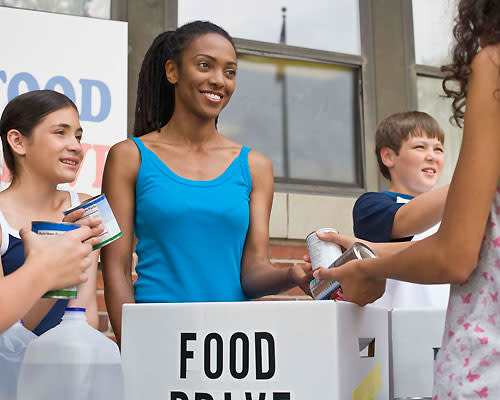 Shine On
Shine OnWhat food banks need most this holiday season

Holidays often stretch household budgets tighter than ever, making it difficult for some people to cover the basics like a holiday meal. But, simply sign your name to the Food for Families site online and Kraft Canada will donate $1 to a local food bank of your choice with a goal of $50,000. All donations go towards food for those in need and resources for participating food banks. The local food bank with the most names will also be given an extra $10,000. Visit KraftAssists.ca to donate.
While the holiday season is a time of plenty for some families, it’s not all festive cheer. Many can’t afford to put gifts under the tree or food on the table — which is why food banks have become a lifeline for millions of Canadians this time of year.
While those in need don’t want to be choosey, having access to healthful, wholesome foods can certainly make a challenging situation easier to bear. In fact, an Ottawa-area food bank recently stopped accepting donations that weren’t considered healthy in order to help promote more healthful donations. The infographic below shows just how close to home hunger hits for many Canadians.
This holiday season, Loblaw is hoping to help combat hunger in a meaningful way by encouraging shoppers to donate two (healthy) items at their local store - this would help food banks meet their demands through March. But what items are needed most, and how can you make sure your donation is healthful?
“Envisioning a healthy dinner plate is a good way to make a meaningful donation to the food bank,” said Amanda Li, Registered Dietitian, Loblaw Companies Limited. “A nutritious dinner plate is half vegetables, a quarter lean protein and a quarter complex carbohydrates. It’s no coincidence that these are some of the items food banks need most.”
Here’s her advice for ensuring your donation is the best possible this holiday season:
Vegetables and Fruits
Dark green or orange veggies with no added fat, sugar or salt are best. “No salt added,” “packed in water” and “unsweetened” marking on the label are good tip-offs. Canned tomatoes, canned green peas or beans, canned diced carrots are excellent veggie options while canned peach slices in water, unsweetened applesauce and dried fruits like apricots, raisins, figs, and dates are good fruit donations.
Whole Grain Products
Whole grains are high in fibre and a great source of energy. Oats, rice, quinoa, barley, whole-grain pasta, and whole-grain crackers make for nutritious donations.
Milk & Alternatives
Milk and alternatives are an important source of Calcium, Vitamin D and Vitamin A. Some of the best donation options include dry powdered milk, tetra packs of shelf-stable milk or fortified beverages like soy milk, rice milk, almond milk or coconut milk.
Meat & Alternatives
Protein allows us to build and maintain muscle tissue. When donating canned meats or alternatives, look for “no salt added,” “low in sodium” and “packed in water” labels. Examples include canned salmon, canned tuna, canned turkey, canned chicken, canned beans, dried beans and lentils, nuts and seeds, nut and seed butters, shelf-stable tetra pack tofu.

